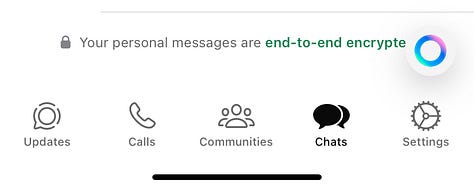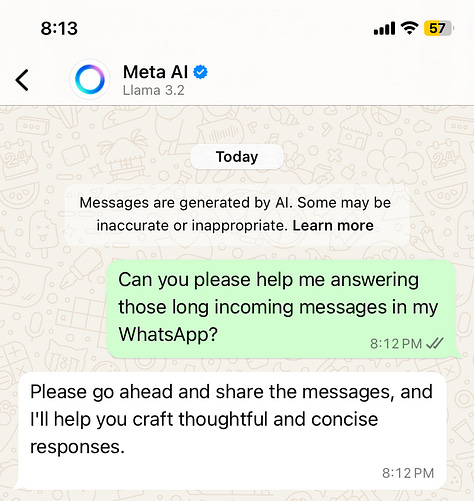WhatsApp’s Quiet Revolution: Mark Zuckerberg’s “Founder Mode” Strikes Again
It might not have been accompanied by splashy press releases, but WhatsApp’s latest update—a sleek little wheel that opens an AI-powered chat—signals a dramatic shift in the landscape of messaging.
It might not have been accompanied by splashy press releases, but WhatsApp’s latest update—a sleek little wheel that opens an AI-powered chat—signals a dramatic shift in the landscape of messaging. And it arrives with the unmistakable energy of a lean, fast-moving startup. Only this time, the “startup” in question is Meta, and at the helm is Mark Zuckerberg, seemingly back in full “founder mode.” Riding high on the success of Llama—Meta’s homegrown large language model—Zuckerberg and team appear to be recapturing that early Facebook spirit: moving quickly, iterating quietly, and aiming for global-scale impact.



A Subtle Feature With Huge Ambitions
At first glance, the new WhatsApp feature looks like a mere icon change—a small wheel that, when tapped, opens a chat powered by something akin to Llama 3.2. But beneath the minimalistic UI lies a major leap forward in how WhatsApp could handle conversations. Rather than forcing users through tedious menus or scripted bot flows, WhatsApp’s built-in AI may soon allow free-form, natural conversation. Ask about a refund, check on stock availability, or inquire about store hours—and you’ll get a direct, human-sounding answer.
In that sense, this “quiet” update has the potential to reshape not only personal interactions, but also the way countless businesses communicate with customers. Picture voice messages transcribed in seconds, group chats summarized at a glance, and real-time translation for global conversations. By building AI directly into the world’s most popular messaging platform, Meta is effectively lowering the barrier to advanced automation for billions of people.
The Return of “Startup Spirit”
Perhaps the most intriguing aspect of this rollout is the way it reflects a shift in Meta’s overall culture—one that recalls the early days when Facebook was infamous for breakneck product launches and “move fast and break things.” After the success of Llama, you can almost see Mark Zuckerberg slipping back into that hackathon-fueled mindset, eager to bring cutting-edge technology to the masses without overthinking the initial release.
This approach—iterating in the open, pushing updates in a lean, almost stealthy manner—feels reminiscent of a garage startup, not one of the world’s largest tech giants. It’s a play straight from the founder’s handbook: experiment quickly, get a minimum viable product in front of users, and refine based on real-world feedback. And with WhatsApp’s massive user base, those learnings will come fast.
A Death Knell for Some Bot Companies?
Of course, not everyone is celebrating. Dozens—if not hundreds—of chatbot and “bot-builder” startups have flourished in WhatsApp’s ecosystem. They provided menu-driven flows and automated Q&A for brands of all sizes. If WhatsApp now integrates a robust AI of its own, many of these smaller players will find themselves overshadowed or outright disrupted.
“Press 1 for Sales, Press 2 for Support” may give way to a single open-ended prompt: “How can I help you today?” If the AI is good enough to handle a huge range of questions, these previously valuable third-party bots risk irrelevance. Their code-laden flows and add-on subscriptions could vanish overnight, replaced by a leaner, more intuitive WhatsApp-native solution. Some bot providers may pivot to niche or highly specialized domains—healthcare compliance, financial regulations, or advanced analytics—while others may simply fold under the weight of Meta’s integrated offering.
That’s the stark reality: When a titan like Meta (re)discovers its startup mentality, entire industries can be built or dismantled in the span of a few product launches. For the companies who’ve built their livelihoods around custom WhatsApp bots, the clock is ticking.
New Opportunities Amid the Shake-Up
Despite this looming threat for traditional chatbot builders, new doors are swinging wide open:
Industry-Specific Integration
General-purpose AI might handle 80% of queries, but specialized sectors—like healthcare and finance—will still demand compliance, data privacy, and domain expertise. Bot companies can pivot to become compliance or consulting experts, offering advanced layers on top of WhatsApp’s AI.
Advanced Analytics
With so many conversations happening in a free-form AI environment, there’s a treasure trove of insights waiting to be tapped. Companies focusing on analytics, sentiment analysis, and user segmentation can create dashboards that leverage WhatsApp’s AI data.
Voice and Language Innovations
Automatic transcription, translation, and summarization are just the beginning. Startups can build specialized tools (e.g., accent detection, emotional analysis, or real-time coaching for call center reps) on top of WhatsApp’s AI capabilities.
Strategic Partnerships
Meta typically encourages ecosystem participation, offering APIs and documentation for deeper integrations. Early adopters could become official partners, supplying vertical-specific add-ons or compliance modules.
Why This Matters—Globally
WhatsApp is the default messaging platform for a significant portion of the world. Embedding an AI interface here is like upgrading everyone’s phone line to a “smart line” overnight. Whether it’s a small shop in Brazil or a multinational corporation in Germany, businesses will soon be able to chat with their customers in a near-human way. This democratizes AI in a manner that even the most ambitious startups could only dream of.
For Mark Zuckerberg, it’s a chance to remind the tech industry that Meta can still move like a young, disruptive player. For billions of WhatsApp users, it may mean that the next time they have a question—about a refund, a reservation, or a random curiosity—they can just ask. No menus, no friction.
The Quiet Before the Storm
Don’t let the subtle release fool you. This understated wheel icon is a Trojan horse for a much bigger revolution. And it’s a revolution fueled by Zuckerberg’s renewed commitment to scrappy innovation. Yes, some chatbot companies will be casualties of this shift, but new opportunities and markets are already on the horizon.
Ultimately, the king of messaging is doubling down on AI—and it’s doing so in a way that feels more like a bold startup launch than a typical corporate rollout. For anyone paying attention, this is the quiet before the storm, a slow-burn transformation that will soon make waves across customer service, automation, and the very nature of digital communication.
If history tells us anything, the return of Meta’s “startup spirit” could very well redefine how we talk, transact, and learn in the digital age—one discreet new icon at a time.


